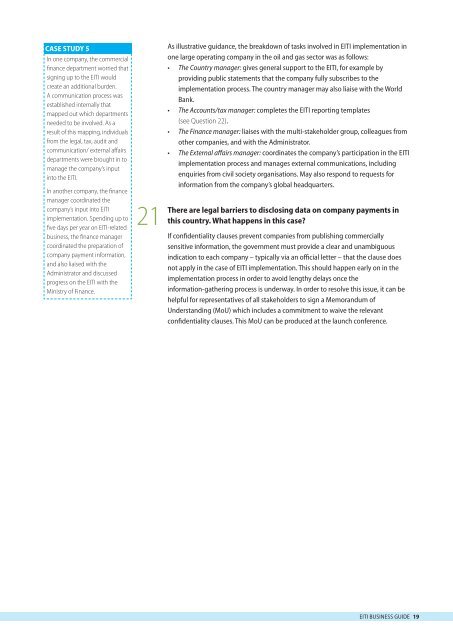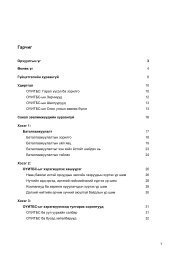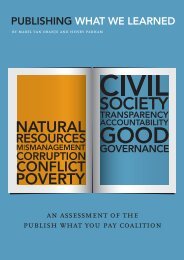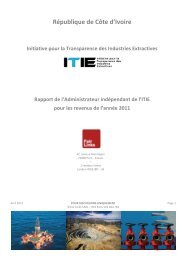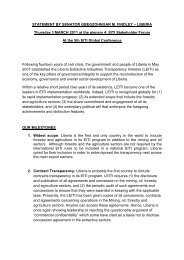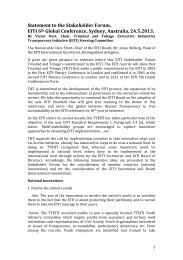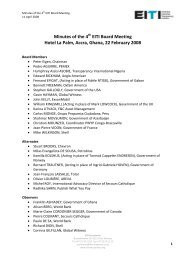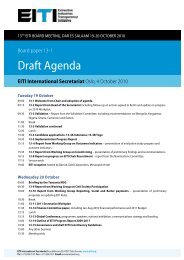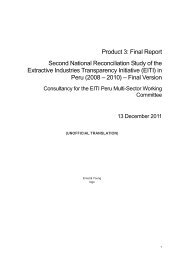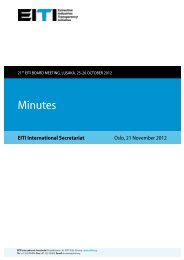EITI Business Guide
EITI Business Guide
EITI Business Guide
Create successful ePaper yourself
Turn your PDF publications into a flip-book with our unique Google optimized e-Paper software.
CASE STUDY 5<br />
In one company, the commercial<br />
finance department worried that<br />
signing up to the <strong>EITI</strong> would<br />
create an additional burden.<br />
A communication process was<br />
established internally that<br />
mapped out which departments<br />
needed to be involved. As a<br />
result of this mapping, individuals<br />
from the legal, tax, audit and<br />
communication/ external affairs<br />
departments were brought in to<br />
manage the company’s input<br />
into the <strong>EITI</strong>.<br />
In another company, the finance<br />
manager coordinated the<br />
company’s input into <strong>EITI</strong><br />
implementation. Spending up to<br />
five days per year on <strong>EITI</strong>-related<br />
business, the finance manager<br />
coordinated the preparation of<br />
company payment information,<br />
and also liaised with the<br />
Administrator and discussed<br />
progress on the <strong>EITI</strong> with the<br />
Ministry of Finance.<br />
21<br />
as illustrative guidance, the breakdown of tasks involved in <strong>EITI</strong> implementation in<br />
one large operating company in the oil and gas sector was as follows:<br />
• The Country manager: gives general support to the <strong>EITI</strong>, for example by<br />
providing public statements that the company fully subscribes to the<br />
implementation process. The country manager may also liaise with the World<br />
Bank.<br />
• The Accounts/tax manager: completes the <strong>EITI</strong> reporting templates<br />
(see Question 22).<br />
• The Finance manager: liaises with the multi-stakeholder group, colleagues from<br />
other companies, and with the administrator.<br />
• The External affairs manager: coordinates the company’s participation in the <strong>EITI</strong><br />
implementation process and manages external communications, including<br />
enquiries from civil society organisations. May also respond to requests for<br />
information from the company’s global headquarters.<br />
There are legal barriers to disclosing data on company payments in<br />
this country. What happens in this case?<br />
If confidentiality clauses prevent companies from publishing commercially<br />
sensitive information, the government must provide a clear and unambiguous<br />
indication to each company – typically via an official letter – that the clause does<br />
not apply in the case of <strong>EITI</strong> implementation. This should happen early on in the<br />
implementation process in order to avoid lengthy delays once the<br />
information-gathering process is underway. In order to resolve this issue, it can be<br />
helpful for representatives of all stakeholders to sign a Memorandum of<br />
understanding (Mou) which includes a commitment to waive the relevant<br />
confidentiality clauses. This Mou can be produced at the launch conference.<br />
<strong>EITI</strong> BusInEss GuIdE 19


